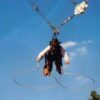Ukraine’s Counteroffensive Is More Successful Than You Think
![]()
Ukraine’s Counteroffensive Is More Successful Than You Think
The focus on the stalled land war obscures major successes in Crimea and the Black Sea.
By Oz Katerji, a British Lebanese freelance journalist focusing on conflict, human rights, and the Middle East, and Vladislav Davidzon, the European culture correspondent at Tablet.
My FP: Follow topics and authors to get straight to what you like. Exclusively for FP subscribers. Subscribe Now | Log In
OCTOBER 20, 2023, 1:59 PM
Recent coverage of the war in Ukraine in the Western media has focused heavily on Kyiv’s land offensive, especially attempts to push toward the Black Sea coast. Much of the scrutiny, rightly or wrongly, has been on Kyiv’s lack of significant progress so far this year, with nothing comparable to last year’s breakthrough offensives in Kharkiv and Kherson.
While some of this criticism may be justified, the almost singular Western focus on territorial breakthroughs has distracted from the fact that Ukraine is fighting a medium- to long-term war on multiple fronts against a significantly larger and heavily entrenched foe. What’s more, the lack of a major Ukrainian land advance obscures the very real battlefield successes Ukraine has had in other theaters of the conflict—most notably in Russian-occupied Crimea and the Black Sea.
A crucial part of Kyiv’s long-term plan for the war is to push Russia out of the Crimean Peninsula and the rest of the Russian-occupied parts of Ukraine’s coastline. Since the start of the full-scale invasion, Russia’s Black Sea Fleet, headquartered at the Crimean port of Sevastopol, has been a critical component of Moscow’s war effort. Russian warships operating out of Sevastopol have enforced a blockade of Ukraine’s coastline and launched cruise missiles to rain hell onto Ukrainian cities and infrastructure.
But over the last several months, Ukraine has achieved a series of startling victories in and around Crimea, including missile strikes against the Kerch Strait bridge and multiple daring attacks on the Black Sea Fleet itself—with major impacts on the Russians’ ability to operate on the peninsula and in the western Black Sea.
In September, the Ukrainians carried out a series of missile strikes against Russian naval assets in Sevastopol, including a landing ship, a submarine, and the headquarters of the Black Sea Fleet itself—reportedly while several high-ranking commanders were inside. Some of these strikes were carried out using Storm Shadow cruise missiles recently supplied by Britain and France. The Ukrainians have also ratcheted up their strikes against Russian logistics, repair, and infrastructure hubs on the peninsula with the intent of degrading Russia’s ability to support its fleet. Earlier this month, Kyiv claimed responsibility for two further attacks on the Russian fleet, using a new type of sea drone to strike the Russian cruise missile carrier Buyan and carrying out a sabotage attack on the Pavel Derzhavin, a Russian patrol ship. These strikes came after the Ukrainians had methodically attrited Russian anti-missile defense structures in Crimea over the previous weeks.
https://buy.tinypass.com/checkout/offer/show?displayMode=inline&containerSelector=.post-content-main%20.in-article-piano-gating-container&templateId=OTMIWLMH52WC&offerId=OFXRBX5MFCAE&formNameByTermId=%7B%7D&hideCompletedFields=true&showCloseButton=false&experienceId=EX18WC8F65D6&activeMeters=%5B%7B%22meterName%22%3A%22DefaultMeter%22%2C%22views%22%3A1%2C%22viewsLeft%22%3A0%2C%22maxViews%22%3A1%2C%22totalViews%22%3A1%7D%5D&widget=offer&iframeId=offer-1-VbjFc&url=https%3A%2F%2Fforeignpolicy.com%2F2023%2F10%2F20%2Fukraine-crimea-black-sea-counteroffensive-russia-fleet-navy-drones-war%2F&parentDualScreenLeft=0&parentDualScreenTop=0&parentWidth=1536&parentHeight=739&parentOuterHeight=816&aid=beVmoi3WRm&browserId=lnzsk58yjrjr4120&pianoIdUrl=https%3A%2F%2Fid.tinypass.com%2Fid%2F&userProvider=piano_id&userToken=&customCookies=%7B%7D&hasLoginRequiredCallback=true&initMode=context&abTestIds=%5B%22splitTestVariantGM8F8NSWXU4T175%22%5D&requestUserAuthForLinkedTerm=true&width=1&_qh=d6b8f0abb3
These successes constitute a major breakthrough for Ukraine. Its strikes against Crimea have now made it all but impossible for the Russian Black Sea Fleet to continue to operate freely in the western Black Sea. The Russian Navy has responded by moving its warships farther east, to the naval base in Novorossiysk, a port city on the Russian mainland. The effect is to push the Russian fleet farther and farther into the eastern recesses of the Black Sea—a step toward Kyiv’s long-term objective of removing the Russians from the occupied peninsula by rendering it unfeasible for operations. This combination of attrition and displacement has had the effect of diminishing the Russian fleet’s capacity to patrol the waters near the Ukrainian ports, partially relieving pressure on the international shipping lanes in the Black Sea. This could allow Kyiv to achieve another goal of these operations: opening up Odesa’s three deep-water ports to international merchant shipping for grain and other goods.
The Russian blockade of the Ukrainian ports had been alleviated by a Turkish and U.N. deal brokered in the summer of 2022 that had allowed certain amounts of Ukrainian goods—especially grain—to be exported through civilian shipping corridors. Moscow had been offered limited sanctions relief in exchange. The Kremlin withdrew from the agreement in July 2023, reestablished a blockade of all commercial shipping flowing to Odesa, and began a series of drone and missile strikes against Ukrainian grain export facilities. The cumulative effect of the blockade was to make insurance prices for shipping in and out of Ukraine spike and allow Russian grain exports to start dominating the markets. In August, Kyiv’s response was to institute an alternative humanitarian sea corridor that ran closely along the Ukrainian coast and would be protected by the navies of NATO members Bulgaria and Romania. The gamble that Russian threats to interdict shipping were a bluff and that they would not fire on internationally flagged ships paid off. By now, 32 intrepid international vessels have left Ukraine’s ports for Africa and elsewhere with their holds full of grain.
Ukraine has also undertaken successful commando raids by small teams of elite naval infantry to achieve its objectives. In Crimea, Ukraine managed to destroy or disable Russian anti-air missile installations in preparation for bombardment of the peninsula. Among other objectives, these actions allowed Ukraine to retake strategically located oil and gas drilling rigs captured by the Russians at the start of the war, which they had used for maritime radar surveillance. The fact that Kyiv only has a limited arsenal of Western-provided precision long-range missiles means that the Ukrainians have had to be very resourceful with their deployment, including by eliminating as much of Russia’s air defense as possible before launching them.
At the same time, the Ukrainians have also been successful in developing a new generation of sophisticated, locally made sea drones capable of striking past the defenses of the Russian fleet. The Russian anti-missile and traditional ship defense systems have proved incapable of offering protection against this new generation of sea drones, including the Ukrainian “Sea Baby” series of partially submerged attack drones. Representing a tiny fraction of the cost of an advanced Russian battleship, landing ship, or submarine, these relatively inexpensive and quickly constructed drones have proved themselves to be a radical innovation.
By the end of the summer, the Ukrainians had proved not only capable of sinking or maiming serious Russian naval assets, but also of making the further use of Sevastopol unsustainable for the Black Sea Fleet. The British Ministry of Defense assessed that Russia had “relocated many of its prestige assets—including cruise missile capable ships and submarines—from Sevastopol to operating and basing areas further east, such as Novorossiysk.” Furthermore, on Oct. 5, the leader of the Russian-occupied Georgian region of Abkhazia, which is located even farther east than Novorossiysk, made public statements that his Moscow-backed region would soon host a “permanent point of deployment” for the Russian Navy. Such a base would be located almost at the very eastern end of the Black Sea, suggesting that the Russians have concluded that stationing naval assets anywhere near Ukraine and its now heavily mined shoreline is untenable.
These successes have had the effect of severely restricting Russia’s range of mobility in the Black Sea. British Armed Forces Minister James Heappey said, “The functional defeat of the Black Sea Fleet, and I would argue that is what it is, because it has been forced to disperse to ports from which it cannot have an effect on Ukraine, is an enormous credit.”
READ MORE
The West Paid for Putin’s Huge New Gas Project
Despite sanctions, the United States and Europe continue to cooperate on Russia’s lucrative fossil fuel ventures.
Where Does Russia Stand on the Israel-Hamas War?
Moscow may temporarily profit from the West’s focus on the Middle East, but navigating its ties in the region will be tricky.
Ukraine Targets Russia With Secret New Supply of U.S. Weapons
Kyiv scores hits with long-awaited ATACMS system.
Given that the total liberation of Crimea is a key objective for Kyiv, these significant Ukrainian successes must be put into the same context as the other developments in this multifront conflict—something that much of the Western press and commentariat have failed to do. By effectively dislodging the Russian Black Sea Fleet from Sevastopol and unilaterally opening a grain shipment corridor, Kyiv has achieved stunning successes with only limited naval capabilities. While Ukraine is still a long way from hoisting its flag over Simferopol, the Crimean capital, this kind of progress would have been unthinkable last year.
The success of Ukrainian naval operations against the Russian fleet has been all the more remarkable as Ukraine functionally no longer has a navy. Since 2014, the Russians have sunk, captured, or incapacitated all major Ukrainian warships except the flagship frigate Hetman Sahaidachny, which the Ukrainians themselves scuttled in early 2022 to prevent it from falling into Russian hands. Ukrainians have begun to routinely crack jokes about the mighty Russian Black Sea Fleet being sunk by a nation with no navy, but Russian naval officers are unlikely to be smiling.
The Ukrainian military has proved itself capable of incorporating new equipment into its arsenal quickly and to devastating effect—whether that be homegrown sea drones or Anglo-French-supplied missiles. If Western governments want to see more successes on the battlefield, providing Ukraine with more and longer-range missiles to continue denying Russia the freedom to move in Crimea would be a good place to start. Either way, Western observers should stop focusing only on the land war and put these remarkable Ukrainian achievements into the context they deserve. Otherwise, arguing in favor of providing Kyiv with the tools it needs to liberate its territories will be harder than it needs to be.
My FP: Follow topics and authors to get straight to what you like. Exclusively for FP subscribers. Subscribe Now | Log In
Oz Katerji is a British Lebanese freelance journalist focusing on conflict, human rights, and the Middle East.
Vladislav Davidzon is the European culture correspondent at Tablet, a fellow at the Atlantic Council’s Eurasia Center, and the author of From Odessa With Love.
READ MORE ON RUSSIA | UKRAINE | WAR
Join the Conversation
Commenting on this and other recent articles is just one benefit of a Foreign Policy subscription.
Already a subscriber? Log In.
![]()
Sign up for Editors’ Picks
A curated selection of FP’s must-read stories.
latest
Biden Asks Congress for $105 Billion to Back Israel, Ukraine
OCTOBER 20, 2023, 7:00 PM
Why Erdogan Is Unlikely to Cut Ties With Hamas
OCTOBER 20, 2023, 5:39 PM
New Season of Global Reboot Coming Soon
OCTOBER 20, 2023, 4:14 PM
Cairo Needs Cash and Gazans Need Shelter. Can a Deal Be Brokered?
OCTOBER 20, 2023, 3:51 PM
Biden’s ‘Inflection Points’ Don’t Add Up
OCTOBER 20, 2023, 3:29 PM
Why Biden has stopped framing democracies against autocracies | FP Live

EDITORS’ PICKS
- 1Biden’s Unquestioning Support for Israel Could Be a Costly Error
- 2How Israel’s Spies Failed—and Why Escalation Could Be Catastrophic
- 3India’s Spat With Canada Is a Win-Win Situation for Modi
- 4Why Egypt Won’t Open Its Border With Gaza
- 5Biden’s ‘Inflection Points’ Don’t Add Up
- 6Ukraine’s Counteroffensive Is More Successful Than You Think
latest
Biden Urges U.S. Congress to Back Israel, Ukraine With $105 Billion Aid Bill
OCTOBER 20, 2023, 7:00 PM
Turkey’s Erdogan Unlikely to Cut Hamas Ties Despite Wanting Normalization With Israel
OCTOBER 20, 2023, 5:39 PM
New Season of Global Reboot Coming Soon
OCTOBER 20, 2023, 4:14 PM
Cairo Needs Cash and Gazans Need Shelter. Can a Deal Be Brokered?
OCTOBER 20, 2023, 3:51 PM
Biden’s ‘Inflection Points’ Don’t Add Up
OCTOBER 20, 2023, 3:29 PM
MORE FROM FOREIGN POLICY
The Scrambled Spectrum of U.S. Foreign-Policy Thinking
What Does Victory Look Like in Ukraine?
The Biden Administration Is Dangerously Downplaying the Global Terrorism Threat
No, the World Is Not Multipolar
trending
- Ukraine’s Counteroffensive Is More Successful Than You ThinkANALYSIS | OZ KATERJI, VLADISLAV DAVIDZON
- How Israel’s Spies Failed—and Why Escalation Could Be CatastrophicANALYSIS | URI BAR-JOSEPH, AVNER COHEN
- America Is a Root Cause of Israel and Palestine’s Latest WarARGUMENT | STEPHEN M. WALT
- India’s Spat With Canada Is a Win-Win Situation for ModiANALYSIS | C. CHRISTINE FAIR
- Why Egypt Won’t Open Its Border With GazaAFRICA BRIEF | NOSMOT GBADAMOSI
latest
Biden Asks Congress for $105 Billion to Back Israel, Ukraine
OCTOBER 20, 2023, 7:00 PM
Why Erdogan Is Unlikely to Cut Ties With Hamas
OCTOBER 20, 2023, 5:39 PM
New Season of Global Reboot Coming Soon
OCTOBER 20, 2023, 4:14 PM
Cairo Needs Cash and Gazans Need Shelter. Can a Deal Be Brokered?
OCTOBER 20, 2023, 3:51 PM
Biden’s ‘Inflection Points’ Don’t Add Up
OCTOBER 20, 2023, 3:29 PM
![]()
Sign up for World Brief



















